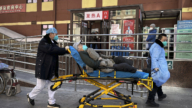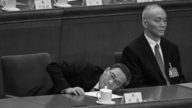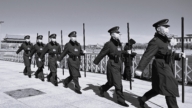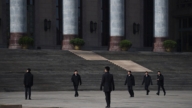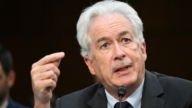【新唐人2013年11月16日讯】中共新政信誓旦旦的改革,随着三中全会的闭幕,最终以坚持公有制为主体的老路画上了句号。最新消息传出,为了防止中共立即崩溃,在会议期间,中共领导人习、李不得不放弃先前的主张,来保住中共政权。外界指出,30多年前,双轨制的经济改革带来的经济形势好转,支撑了中共的继续执政,不过从现在跛足的改革来看,原来的老路已经走不通了。
近几个月来,中共总理李克强一再宣称,要壮士断腕深化改革,三中全会前夕,习近平也宣称不再摸石头过河,要进行一场“范围和力度空前的全方位改革”。
而中共三中全会《公报》声称,全面深化改革,必须高举所谓中国特色社会主义的旗帜,以所谓马克思列宁主义为指导,“以公有制为主体”。
中国经济学家茅于轼:“世界上成功的没有一个是公有制的,公有制为主的全都失败了,包括中国,中国成功不是因为坚持公有制,因为引进了私有制,所以把公有认为是我们成功的原因,是整个看错问题了。”
《美国之音》评论说,中国公众对中共宣传了30多年的“改革”已经感到十分恐惧,甚至十分憎恶。
所谓公有制经济,定义上,是生产资料归全体人民群众所有。而当今的中国,中共权贵将国有企业当成了自己的摇钱树。前中共党魁江泽民家族控制了中国电信行业,曾庆红、周永康家族控制了石油能源,李鹏家族控制了电力行业。隐藏较深的还有,刘云山的儿子是著名的金融大亨,李长春家族则掌控了部分文化基金。
三中全会前夕,“中石油”和“中石化”公司双双发布了2013年三季报,声称前面三个季节实现净利1469亿元,每天能赚5.38亿元。
中国经济学家茅于轼告诉《新唐人》,国有企业全面处于亏损状态,每年仅仅向国家上缴10%的利润,还叫苦连天,
北京天则经济研究所的研究报告显示,2001年至2009年,国有及国有控股企业,平均净资产收益率为8.16%,如果扣除各种补贴,平均的真实净资产收益率为-6.29%。
北京天则经济研究所所长盛洪在香港媒体的专访中表示,国企是自由企业制度的破坏者。盛洪拿铁道部举例说,铁道部表面是行政部门它垄断的同时,还可以利用行政权力获得很多政府资源﹔在疯狂投资的同时,编出一些故事,上很多项目,而他们要求的金钱数额,又远远高出这些项目实际需要的费用,于是他们拿着剩余的钱,做所谓的第三产业投资。
大陆反腐记者王克勤:“按道理来讲,在座的都应该是国有企业的所有人,都是股东,既然是股东,请问你有没有行使过自己财产的股份权,有没有行使过自己资产的收益权,你连知情权都没有,我们的权利全被代表了,这就是公有制最可怕的地方。”
大陆反腐调查记者王克勤在大学讲课时说,正因为公有制,才出现官员利用职权强拆占农民土地,农民却没有办法,也正因为公有制,才会造成国有企业几十个亿、上百亿的财产,被省长或市长的小舅子用几千万收买。
中国的石油由“中石油”、“中石化”两家国有企业垄断,天则经济研究所今年发布的一份报告中显示,按照税前的价格做比较,同等品质的成品油,中国的价格,比国际上几个主要国家的平均价格要高出31%。
而中共的国有资产,来源于中共第一次经济改革,当年中共通过血腥的方式,打土豪分田地,以及公私合营等,把地主资本家的财产,缴为所谓国有,再通过剥削中国人民的廉价劳动力,用一个国家的力量把这些企业扩大,如今落入中共寡头私人腰包。
采访编辑/刘惠 后制/周天
Desperate to Survive: CCP Keeps Tight Grip on Public Ownership
The CPC new promised deal’s reformation made the decision at
the Third Plenary Session closing.
It has to uphold the old system of common
ownership as the mainstay.
The Latest news said that Chinese leaders Xi Jinping and Li
Keqiang had to give up the previous proposition to keep the
regime and prevent the CCP’s immediate collapse.
Outsiders pointed out that dual track economic reform had
improved the economic situation and supported the
CCP’s ruling for over 30 years.
But now, the old system has reached a dead end
with lame reform.
In recent months, the Chinese Premier Li Keqiang repeatedly
claimed to deepen the reforms in China and
“cut losses quickly".
On the eve of the Third Plenum, Xi Jinping also claimed to
carry out a full range reform with an unprecedented scope and
strength without “touching the stone across the river".
The “Communique" of the Third Plenary Session of the CPC
claimed that to comprehensively deepen reform,
we must hold high the great banner of socialism
with the Chinese characteristics in guidance
of Marxism-Leninism, using the
mainstay as common ownership.
Chinese economist Mao Yushi: No country with public
ownership has been successful including China.
China’s success is not because of common ownership but the
introduction of private ownership.
So it’s totally wrong to claim common ownership
as the reason of success.
“Voice of America" commented that the Chinese public felt
very scared and even hate the
CCP’s over 30 years’ reform propaganda.
The so-called public sector definition is the means of
production owned by the whole people.
And today’s China, the CCP’s dignitaries made the state
owned enterprises as their money spinner.
Former CCP leader Jiang Zemin’s family control the Chinese
telecommunications industry, Zeng Qinghong and Zhou
Yongkangs’ families control the oil and energy; Li Peng’s
family control the power sector.
Things deeply hidden are Liu Yunshan’s son is a famous
financial tycoon; Li Changchun’s family then took partial
control of of the Cultural Fund.
On the eve of the Third Plenum, “PetroChina" and “Sinopec"
both released their third quarterly report for 2013, claiming
that the previous three seasons’ net profit are 146.9 billion
yuan which means 538 million yuan net profit each day.
Chinese economist Mao Yushi told New Tang Dynasty that
state owned enterprises operated totally at a loss and felt
the pinch by paying to the state only 10% of
the profits each year.
The study report of “Beijing Tianze Economic Research
Institute" shows that from 2001 to 2009, the average net
assets of state-owned and state holding enterprises is 8.16%;
the real average net assets is -6.29% without
all of the subsidies.
“Beijing Tianze Economic Research Institute" director Sheng
Hong said to the Hong Kong Media, state-owned enterprises
is the destroyer of the free enterprise system.
For example, the Ministry of Railways is an executive branch
apparently, it can not only monopolize the business but also
obtain many government resources
through administrative powers.
Other than crazy investing, they also compiled some stories
on many projects, which required much more money than the
actual costs for these projects.
So they took the remaining money to do the so-called
third industrial investment.
China anti-corruption reporter Wang Keqin: Logically
speaking, you are all the owners of state-owned enterprises.
Since you are shareholders, do you have shareholders right
and the usufruct right?
You don’t even have the right to know and
all of our rights have been representative.
That’s the most horrible thing of common ownership.
China anti-corruption investigative reporter Wang Keqin talked
in his university’s lectures that farmers can do nothing on
officials’ demolition of their land because
of common ownership.
Common ownership also resulted in the governor or
mayor’s brother in law buying state-owned enterprises’ several
billions worth of property with just tens of millions.
China’s oil is monopolized by “PetroChina" and “Sinopec"
two state-owned enterprises.
“Beijing Tianze Economic Research Institute” released a report
showing that the pre-tax price of the same quality refined oil
in China is 31% higher than the average price in
several major countries.
The CCP’s state-owned assets were from the first economic
reforms of the CCP through the bloody way of expropriating
the local tyrants and distributing land , as well as
joint state-private ownership, etc.,
They captured the property of the landlords and capitalists as
so-called state-owned.
They expanded these state-owned enterprises with the strength
of a country by the exploitation of cheap Chinese labor.
Lastly, these properties fell into private pockets
of the CPC oligarchs.
Interview & Edit/LiuHui Post-Production/ZhouTian



